As discussed in this post, ArtsRiot is the primary venue for the VSO's Jukebox series featuring their string quartet. It is both restaurant and concert space, managed under the same umbrella but operating in separate rooms. As such, it is usually our easiest dinner choice before the concert. The cuisine is described as "inspired by flavors from around the globe," which in this case typically means American/Asian fusion.
ArtsRiot would seem to be in transition at the moment, looking to emphasize the event hosting aspect of the business over the dining. The food is still perfectly nice but there's less of it. The menu - not even available for viewing on the website anymore - is significantly reduced, marketed as tailored to the evening's concert. Servings are smaller, too. I'm pretty sure the 400 Burger I ordered used to come with fries. No longer. This change is not a deal breaker for us. In a fair trade, the prices were lower, too, I believe. We managed under $50 for the three of us, not bad for a night out. The cost was helped by the fact that I was the only one to order an alcoholic beverage: an impressive, pint-size can of Lagunitas Sumpin' Easy. Also, no dessert was offered. We were even warned off what gelato was available. Not soft enough to eat.
Our daughter's favorite thing about the restaurant is the Guns 'n' Roses poster on the ceiling above the loft. She always checks to make sure it's still there.
For the concert, the quartet was joined by a soprano vocalist, Mary Bonhag. She's a wonderfully dynamic performer. I might quibble with some of her classical technique - taller, rounder vowels would be nice - but she more than makes up for it with her daring and her variety. The program began with the atypically conventional "Laudamus Te" from Mozart's C Minor Mass but also included the downright bizarre "Sequenza III for Female Voice" by Luciano Berio.
Ms. Coffey, in the following, offers more of the technique I would wish:
Just to clarify, I like weird. The Berio:
A fun evening.
Squid on the Vine
Terra Santa, Ile d Beaute Vermentinu Chardonnay, 2018
Apple
Smells sweeter than it tastes
Peach aftertaste
My Rating: 8.3
"If more of us valued food and cheer and song over hoarded gold, it would be a merrier world." - J.R.R. Tolkien
Tuesday, January 21, 2020
Friday, January 17, 2020
Star Trek: Home Soil
Episode: "Home Soil"
Series: Star Trek: The Next Generation
Season 1, Episode 18
Original Air Date: February 22, 1988
The Enterprise visits a terraforming colony only to stumble upon a murder mystery. The scientists' own machinery has turned against them. But how? The culprit is fascinating: a new life form, in fact a broadened concept of life. What appear to be tiny, inorganic crystals emit erratic pulses of light and color in defiance of known science. Eventually our heroes realize the crystals are trying to communicate.
The story stumbles along awkwardly in the beginning with much of the weak writing and wooden acting we've unfortunately come to expect in Season 1. But in a delightful turn, "Home Soil" contains one of the most genuinely magical scenes of the entire series. As our heroes are trying to determine the nature of the crystals, they tick off the boxes for living matter, one being reproduction. The moment when the one crystal splits into two with a brilliant flash is one that has stayed with me for years. Science fiction is filled with dazzle, of course. Even so, it's rare to share with the characters in the witnessing of not only something new, but something previously un-imagined. Trek has toyed with the bending of life parameters before, most notably with the silicon-based Horta in TOS's "The Devil in the Dark." But at least that creature was still otherwise recognizable as a life form. "Home Soil"'s crystals are entirely new.
Interestingly, the two episodes share a similar shot of characters staring down into a tunnel: Kirk and Spock in the one story, Data and Geordi in the other.
Acting Notes
Walter Gotell plays the part of Kurt Mandl, lead scientist at the colony. Gotell was born March 15, 1924 in Bonn, Germany. His family emigrated to Britain when the Nazis came to power.
Gotell had roles in several major films, including The African Queen, The Guns of Navarone and The Boys from Brazil. It's likely he will always be best remembered for his numerous appearances in the James Bond franchise, featuring in seven movies as two different characters with three different Bond actors. First, he was the henchman Morzeny in From Russia with Love, starring Sean Connery. The recurring character General Gogol first appeared in The Spy Who Loved Me with Roger Moore as Bond. Finally, Gogol appeared in The Living Daylights, Timothy Dalton's first Bond film.
Gotell died of cancer in 1997, age 73.
Series: Star Trek: The Next Generation
Season 1, Episode 18
Original Air Date: February 22, 1988
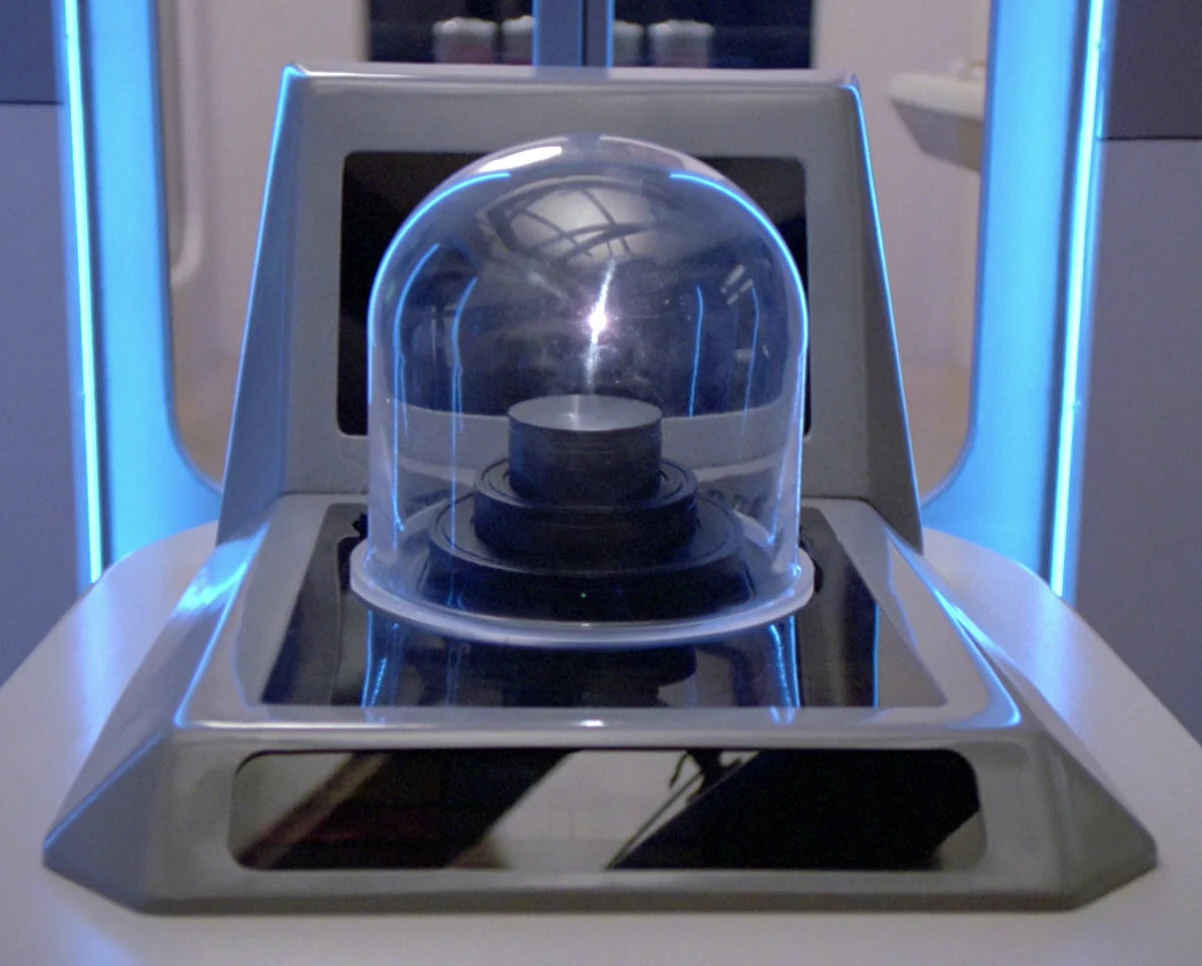 |
| via Memory Alpha |
The Enterprise visits a terraforming colony only to stumble upon a murder mystery. The scientists' own machinery has turned against them. But how? The culprit is fascinating: a new life form, in fact a broadened concept of life. What appear to be tiny, inorganic crystals emit erratic pulses of light and color in defiance of known science. Eventually our heroes realize the crystals are trying to communicate.
The story stumbles along awkwardly in the beginning with much of the weak writing and wooden acting we've unfortunately come to expect in Season 1. But in a delightful turn, "Home Soil" contains one of the most genuinely magical scenes of the entire series. As our heroes are trying to determine the nature of the crystals, they tick off the boxes for living matter, one being reproduction. The moment when the one crystal splits into two with a brilliant flash is one that has stayed with me for years. Science fiction is filled with dazzle, of course. Even so, it's rare to share with the characters in the witnessing of not only something new, but something previously un-imagined. Trek has toyed with the bending of life parameters before, most notably with the silicon-based Horta in TOS's "The Devil in the Dark." But at least that creature was still otherwise recognizable as a life form. "Home Soil"'s crystals are entirely new.
Interestingly, the two episodes share a similar shot of characters staring down into a tunnel: Kirk and Spock in the one story, Data and Geordi in the other.
Acting Notes
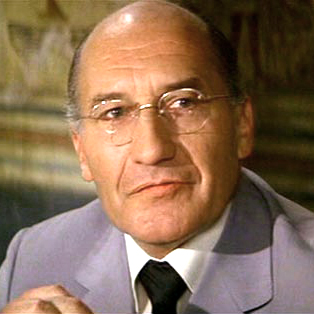 |
| via Wikipedia |
Walter Gotell plays the part of Kurt Mandl, lead scientist at the colony. Gotell was born March 15, 1924 in Bonn, Germany. His family emigrated to Britain when the Nazis came to power.
Gotell had roles in several major films, including The African Queen, The Guns of Navarone and The Boys from Brazil. It's likely he will always be best remembered for his numerous appearances in the James Bond franchise, featuring in seven movies as two different characters with three different Bond actors. First, he was the henchman Morzeny in From Russia with Love, starring Sean Connery. The recurring character General Gogol first appeared in The Spy Who Loved Me with Roger Moore as Bond. Finally, Gogol appeared in The Living Daylights, Timothy Dalton's first Bond film.
Gotell died of cancer in 1997, age 73.
Labels:
comics,
good reading,
sources,
star trek,
TNG
Tuesday, January 14, 2020
Squid on the Vine: The Mixed Blessing of Sugar
Fratelli Levis, Piemonte Barbera
Floral nose
Berries
Starts sweet. Finishes bitter.
Touch of spice
My rating: 8.3
Frederic Mallo, Rosacker Vieilles Vignes, Alsace Grand Cru Riesling, 2010
Peachy finish
Starts sweet, bitter, then sweet again.
Dark yellow
I have a sentimental attachment to this particular vineyard for reasons I won't go into here but it's possible my rating is slightly inflated by bias. Even so, it is genuinely good.
My rating: 9.0
Stefan Meyer, Ein Liter Rhodt Red Blend
Berries
A little jammy but enough bitter to keep it honest
Finishes sweet, then bitter, then sweet.
My rating: 8.4
As I sort out my wine preferences (see here), I am finding one common element for both reds and whites: I like it sweet - not too much, mind you, but I definitely want it there. I love fruit and a grape is a fruit. I'm not looking for Welch's but I want to know I'm consuming a fruit.
With reds, the adjective I seek is "jammy," which implies a particular mouth feel along with the sugar, a pronounced sense of volume. Too much sweetness, though, and it wouldn't taste like wine anymore, just juice with a kick. For whites, Rieslings are definitely heading in the right direction. The German offerings, however, tend to be too sweet. The Alsatians like the example above, on the other hand, are just right. The Stefan Meyer listed above could have done with a bit more spice (indication of alcohol content) but the sugar level was good.
Floral nose
Berries
Starts sweet. Finishes bitter.
Touch of spice
My rating: 8.3
Frederic Mallo, Rosacker Vieilles Vignes, Alsace Grand Cru Riesling, 2010
Peachy finish
Starts sweet, bitter, then sweet again.
Dark yellow
I have a sentimental attachment to this particular vineyard for reasons I won't go into here but it's possible my rating is slightly inflated by bias. Even so, it is genuinely good.
My rating: 9.0
Stefan Meyer, Ein Liter Rhodt Red Blend
Berries
A little jammy but enough bitter to keep it honest
Finishes sweet, then bitter, then sweet.
My rating: 8.4
As I sort out my wine preferences (see here), I am finding one common element for both reds and whites: I like it sweet - not too much, mind you, but I definitely want it there. I love fruit and a grape is a fruit. I'm not looking for Welch's but I want to know I'm consuming a fruit.
With reds, the adjective I seek is "jammy," which implies a particular mouth feel along with the sugar, a pronounced sense of volume. Too much sweetness, though, and it wouldn't taste like wine anymore, just juice with a kick. For whites, Rieslings are definitely heading in the right direction. The German offerings, however, tend to be too sweet. The Alsatians like the example above, on the other hand, are just right. The Stefan Meyer listed above could have done with a bit more spice (indication of alcohol content) but the sugar level was good.
Friday, January 10, 2020
Star Trek: When the Bough Breaks
Episode: "When the Bough Breaks"
Our heroes visit the legendary world of Aldea, likened to Earth's Atlantis. The natives seem hospitable until they kidnap children from the Enterprise. Their own population has gone sterile so they require new blood in order to survive.
Series: Star Trek: The Next Generation
Season 1, Episode 17
Original Air Date: February 15, 1988
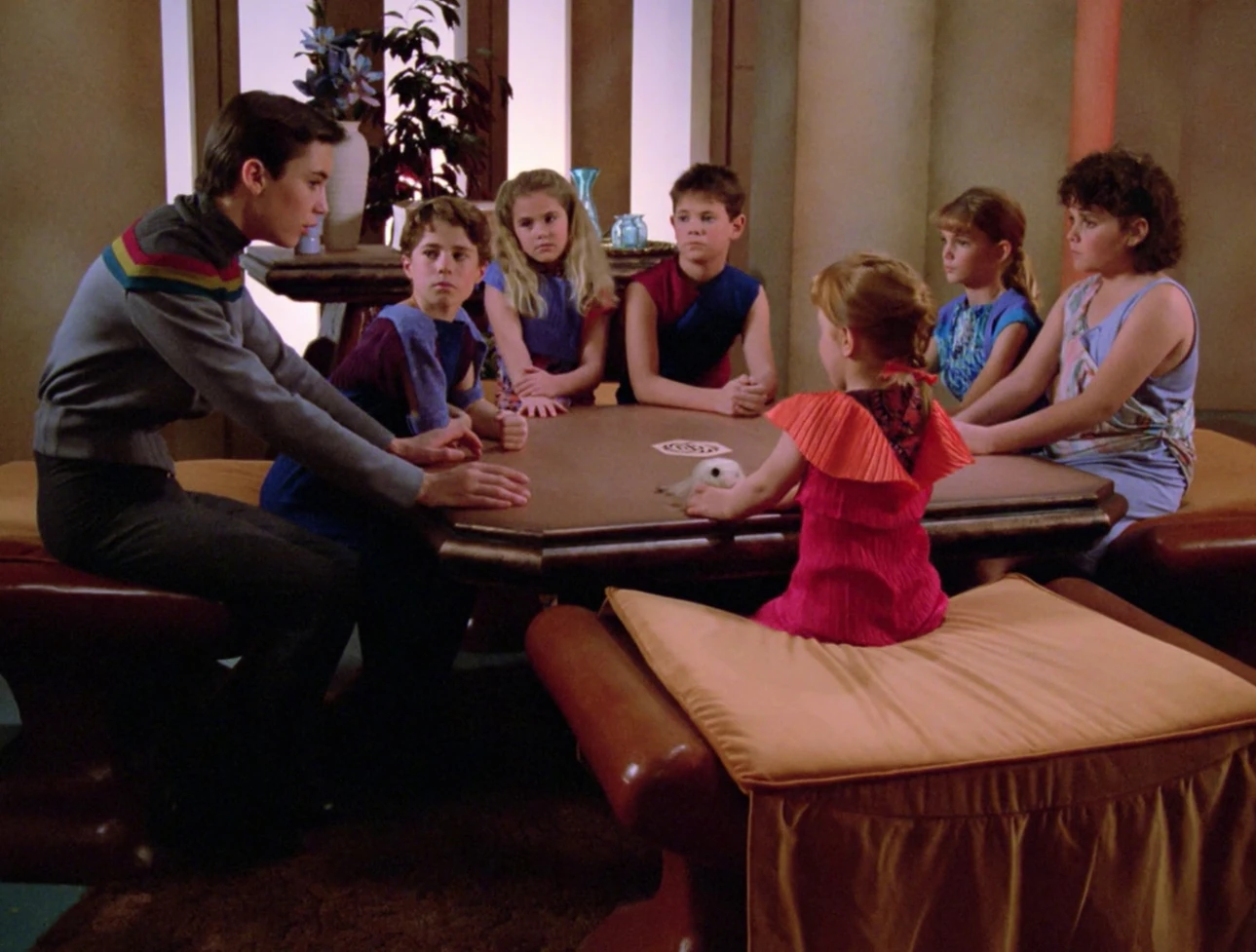 |
| via Memory Alpha |
Our heroes visit the legendary world of Aldea, likened to Earth's Atlantis. The natives seem hospitable until they kidnap children from the Enterprise. Their own population has gone sterile so they require new blood in order to survive.
It's Star Trek with a story about children, generally not a winning combination. If you're going to cast children, you'd better give them good material or they will appear wooden. "Bough Breaks" doesn't work. Don't go blaming Wesley, either. Wil Wheaton does the best he can with what he's been given. The writing stinks. Not his fault.
The material for the adults isn't much better. The story's resolution is way too simplistic. Nice to see Brenda Strong, though, in the role of Rashella. I always appreciate seeing Sports Night people getting work, even before the series! Wheaton's younger brother and sister also appear in un-credited, non-speaking roles.
There is an interesting musical moment. The instrument Katie (Jandie Swanson) plays with Melian (Paul Lambert) is highly reminiscent of that used by the Mule in Asimov's Foundation series. The idea of thinking the music rather than physically manipulating the instrument is similar.
Jerry Hardin plays the role of Radue, leader of the Aldeans. He was born November 20, 1929 in Dallas, Texas. He attended Southwestern University before heading to study at London's Royal Academy of Dramatic Arts.
Hardin has many credits on stage, film and television. His biggest job was as the recurring character Deep Throat in the X-Files series. He appeared in eleven episodes over a seven-season stretch. While he did his best to discourage his children from entering the profession, his daughter Melora has had a long career in television.
The material for the adults isn't much better. The story's resolution is way too simplistic. Nice to see Brenda Strong, though, in the role of Rashella. I always appreciate seeing Sports Night people getting work, even before the series! Wheaton's younger brother and sister also appear in un-credited, non-speaking roles.
There is an interesting musical moment. The instrument Katie (Jandie Swanson) plays with Melian (Paul Lambert) is highly reminiscent of that used by the Mule in Asimov's Foundation series. The idea of thinking the music rather than physically manipulating the instrument is similar.
Acting Notes
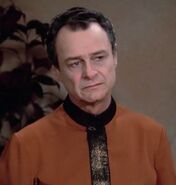 |
| via Memory Alpha |
Jerry Hardin plays the role of Radue, leader of the Aldeans. He was born November 20, 1929 in Dallas, Texas. He attended Southwestern University before heading to study at London's Royal Academy of Dramatic Arts.
Hardin has many credits on stage, film and television. His biggest job was as the recurring character Deep Throat in the X-Files series. He appeared in eleven episodes over a seven-season stretch. While he did his best to discourage his children from entering the profession, his daughter Melora has had a long career in television.
 |
| via Wikipedia |
Tuesday, January 7, 2020
Squid Mixes: Cardamom
Our most recent trip to DC (it's where my parents live) inspired a wrinkle in my quest for the perfect Manhattan: cardamom. My parents' favorite restaurant is Lapis, an Afghan place in Adams Morgan (read here). I have been several times now and have never ordered something I didn't enjoy. Their Lapis Manhattan is delightful: rye, orange peel, cardamom, angostura, vermouth and scotch. The cardamom definitely brought an exciting, spicy kick. Obviously, I had to try it myself!
The question was how much? This recipe for Blueberry Cardamom Manhattans suggested 1/8 teaspoon which seemed as good a starting point as any.
1/8 teaspoon was way too much! My wife, who fortunately didn't mind the intensity as much as I did, has suggested crushing a single seed into the mix instead. Alternatively, one can buy (or make) cardamom bitters. Maybe that's the way to go. I don't know how much whiskey I'm prepared to devote to such experiments but if I can create anything approaching that drink at Lapis, it would be worth it.
Happy, Healthy Squid
A quick fitness update: I've found my phone to be inconsistent in counting steps. So, I'm altering my goals to 11,000 steps or 50 active minutes, which I'll just have to measure with a clock. Perhaps my weight will start heading in the right direction now that the holidays are over, too.
The question was how much? This recipe for Blueberry Cardamom Manhattans suggested 1/8 teaspoon which seemed as good a starting point as any.
1/8 teaspoon was way too much! My wife, who fortunately didn't mind the intensity as much as I did, has suggested crushing a single seed into the mix instead. Alternatively, one can buy (or make) cardamom bitters. Maybe that's the way to go. I don't know how much whiskey I'm prepared to devote to such experiments but if I can create anything approaching that drink at Lapis, it would be worth it.
Happy, Healthy Squid
A quick fitness update: I've found my phone to be inconsistent in counting steps. So, I'm altering my goals to 11,000 steps or 50 active minutes, which I'll just have to measure with a clock. Perhaps my weight will start heading in the right direction now that the holidays are over, too.
Labels:
cocktails,
family adventures,
food,
health
Monday, January 6, 2020
On the Coffee Table: Ali
Title: Ali: A Life
I am not much of a boxing fan. It is undeniably barbaric yet somehow still legal. What Joyce Carol Oates elegantly described as "a stylized mimicry of a fight to the death" I see as two ridiculously strong humans trying their darnedest to knock each other unconscious.
Generally speaking, the popularity of the sport has been in gradual decline for generations. When I first started reading the sports page on a regular basis back in the early '80s, any casual American sports fan could have told you who the heavyweight champion of the world was: Larry Holmes at the time. Right now? I have no idea.
Anthony Joshua of the United Kingdom. He just regained the title last month. I had to look it up.
But there is one boxer whose star never seems to dim - not in retirement, not even in death. Indeed, Muhammad Ali was probably one of the most famous people who has ever lived. The story of his life and career is extraordinary and Eig's biography is remarkably thorough. When Ali first hit the professional ranks in the early '60s, he was faster than any heavyweight the sport had ever seen. He was loud. He was smart. He was handsome. He had a genius for self-promotion long before it became the norm for superstar athletes. He defied every expectation the public had for a black celebrity at the time. Many hated him for it but there was no denying he was the best boxer in the world and a magnetic personality to boot.
Then he dodged the draft. It doesn't seem like such a big deal now in light of what is remembered about the Vietnam era. But it was a very big deal at the time because Ali, a black man expected to be grateful for his good fortune, did it before a generational swarm of white, privileged college students started doing the same. He claimed conscientious objector status on religious grounds as a member of the Nation of Islam, an organization most Americans had never heard of before Ali announced his association. While his lawyers were able to keep him out of jail, he was banned from boxing for three years during what should have been his athletic prime. When he finally did return in the early '70s, his biggest matches - three with Joe Frazier and one with George Foreman - were among the most celebrated contests in all of sport.
A few years ago, I read and reviewed Eig's biography of Lou Gehrig (see here). While I enjoyed the book, I griped over Eig's hero-worship of his subject. He provides a much more honest and well-rounded perspective on Ali. Larger than life was the only way Ali knew how to live but he was far from a perfect hero. He cheated shamelessly on all four of his wives, frequently with their logistical assistance. He was disastrous with money, squandering each accumulated fortune on bad business deals and parasitic associates.
And like too many athletes, he stayed in the game too long. Unfortunately, the consequences for a boxer with such a decision are far more dire than for most. His choice of tactics didn't help. No longer fast enough to stay out of reach, he developed a strategy called rope-a-dope in which he would allow his opponent to take free shots at him until he exhausted himself. He encouraged brutal beatings from his sparring partners, too, in order to prepare for matches. His associates should have stopped him but they didn't, too dependent on his winnings for their own fortunes. The judges should have stopped him but instead they would grant him victories even when he was clearly out-boxed. Towards the end of his career, he was winning on reputation more than skill and being rewarded for not passing out.
Brain damage was inevitable. Contrary to the beliefs of many, myself included, Ali was never diagnosed with Parkinson's disease per se. Instead, he had Parkinson's-like symptoms which were most certainly connected to the abuse he'd taken in the ring.
Overall, Ali does not come across as an especially sympathetic character. Instead, I find more sympathy for his wives - the last, Lonnie, was the one who got rid of the leeches and got his finances in order - and for his greatest boxing rivals. Foreman has never given up his assertion that he was drugged by someone, possibly even his own trainer, during their marathon bout in Zaire. Nor does Eig ever dismiss the possibility that it was true. Holmes told Ali he loved and respected him immediately after dealing out Ali's most brutal loss, and begged the older man to quit boxing for his own health. I even gained sympathy for a couple of greats I'd never heard of before: Ken Norton and Earnie Shavers, just two of the many fighters who lost bouts to Ali on reputation.
For me, the most sympathetic character in the Ali saga has always been Joe Frazier. Their three encounters are probably the most celebrated matches in boxing history. Smokin' Joe never had Ali's flash but he more than made up for it with a nasty left hook. Beyond the ring, the Ali-Frazier story is one of betrayal. Frazier was supportive of Ali during his exile, even lending him money. Frazier came to see Ali as a friend. In the lead up to each of their matches, Ali resorted to low-ball attacks, calling Frazier out as a gorilla and an Uncle Tom. Ali always defended his actions as gamesmanship. Frazier carried the grudge for the rest of his life.
Absolutely, Ali is worth reading. Being a boxing fan is not necessary. I don't know if I'd go so far as to recommend my wife read it but I would certainly read more books like it myself. I don't know if I have the stomach for more boxing but biographies of this quality in general? Yes.
Author: Jonathan Eig
 |
| via Amazon |
I am not much of a boxing fan. It is undeniably barbaric yet somehow still legal. What Joyce Carol Oates elegantly described as "a stylized mimicry of a fight to the death" I see as two ridiculously strong humans trying their darnedest to knock each other unconscious.
Generally speaking, the popularity of the sport has been in gradual decline for generations. When I first started reading the sports page on a regular basis back in the early '80s, any casual American sports fan could have told you who the heavyweight champion of the world was: Larry Holmes at the time. Right now? I have no idea.
Anthony Joshua of the United Kingdom. He just regained the title last month. I had to look it up.
But there is one boxer whose star never seems to dim - not in retirement, not even in death. Indeed, Muhammad Ali was probably one of the most famous people who has ever lived. The story of his life and career is extraordinary and Eig's biography is remarkably thorough. When Ali first hit the professional ranks in the early '60s, he was faster than any heavyweight the sport had ever seen. He was loud. He was smart. He was handsome. He had a genius for self-promotion long before it became the norm for superstar athletes. He defied every expectation the public had for a black celebrity at the time. Many hated him for it but there was no denying he was the best boxer in the world and a magnetic personality to boot.
| via Wikipedia |
Then he dodged the draft. It doesn't seem like such a big deal now in light of what is remembered about the Vietnam era. But it was a very big deal at the time because Ali, a black man expected to be grateful for his good fortune, did it before a generational swarm of white, privileged college students started doing the same. He claimed conscientious objector status on religious grounds as a member of the Nation of Islam, an organization most Americans had never heard of before Ali announced his association. While his lawyers were able to keep him out of jail, he was banned from boxing for three years during what should have been his athletic prime. When he finally did return in the early '70s, his biggest matches - three with Joe Frazier and one with George Foreman - were among the most celebrated contests in all of sport.
A few years ago, I read and reviewed Eig's biography of Lou Gehrig (see here). While I enjoyed the book, I griped over Eig's hero-worship of his subject. He provides a much more honest and well-rounded perspective on Ali. Larger than life was the only way Ali knew how to live but he was far from a perfect hero. He cheated shamelessly on all four of his wives, frequently with their logistical assistance. He was disastrous with money, squandering each accumulated fortune on bad business deals and parasitic associates.
And like too many athletes, he stayed in the game too long. Unfortunately, the consequences for a boxer with such a decision are far more dire than for most. His choice of tactics didn't help. No longer fast enough to stay out of reach, he developed a strategy called rope-a-dope in which he would allow his opponent to take free shots at him until he exhausted himself. He encouraged brutal beatings from his sparring partners, too, in order to prepare for matches. His associates should have stopped him but they didn't, too dependent on his winnings for their own fortunes. The judges should have stopped him but instead they would grant him victories even when he was clearly out-boxed. Towards the end of his career, he was winning on reputation more than skill and being rewarded for not passing out.
Brain damage was inevitable. Contrary to the beliefs of many, myself included, Ali was never diagnosed with Parkinson's disease per se. Instead, he had Parkinson's-like symptoms which were most certainly connected to the abuse he'd taken in the ring.
Overall, Ali does not come across as an especially sympathetic character. Instead, I find more sympathy for his wives - the last, Lonnie, was the one who got rid of the leeches and got his finances in order - and for his greatest boxing rivals. Foreman has never given up his assertion that he was drugged by someone, possibly even his own trainer, during their marathon bout in Zaire. Nor does Eig ever dismiss the possibility that it was true. Holmes told Ali he loved and respected him immediately after dealing out Ali's most brutal loss, and begged the older man to quit boxing for his own health. I even gained sympathy for a couple of greats I'd never heard of before: Ken Norton and Earnie Shavers, just two of the many fighters who lost bouts to Ali on reputation.
 |
| Joe Frazier via Wikipedia |
For me, the most sympathetic character in the Ali saga has always been Joe Frazier. Their three encounters are probably the most celebrated matches in boxing history. Smokin' Joe never had Ali's flash but he more than made up for it with a nasty left hook. Beyond the ring, the Ali-Frazier story is one of betrayal. Frazier was supportive of Ali during his exile, even lending him money. Frazier came to see Ali as a friend. In the lead up to each of their matches, Ali resorted to low-ball attacks, calling Frazier out as a gorilla and an Uncle Tom. Ali always defended his actions as gamesmanship. Frazier carried the grudge for the rest of his life.
Absolutely, Ali is worth reading. Being a boxing fan is not necessary. I don't know if I'd go so far as to recommend my wife read it but I would certainly read more books like it myself. I don't know if I have the stomach for more boxing but biographies of this quality in general? Yes.
Labels:
good reading,
non-fiction books,
sports books
Friday, January 3, 2020
Star Trek: Too Short a Season
Episode: "Too Short a Season"
Series: Star Trek: The Next Generation
Season 1, Episode 16
Original Air Date: February 8, 1988
Our heroes are transporting Admiral Mark Jameson (Clayton Rohner) to a hostage negotiation with an old adversary. To complicate matters, the elderly admiral has taken an anti-aging drug with dramatic but ultimately destructive effects. Meanwhle, the hostage situation is a ruse - a trap intended to ensnare, humiliate and kill Jameson.
"Too Short a Season" is definitely a clunker. Critics have objected to Rohner's over-acting, the bad makeup and the lessened involvement of the TNG principals in favor of the Jameson story - all fair points. As for me, I found the writing weak and forced. Trek has confronted aging issues before in TOS's "The Deadly Years" and TAS's "The Counter-Clock Incident." Frankly, neither of those was especially strong either.
Clayton Rohner was born August 5, 1957 in Palo Alto, California. He graduated from Whitman College which is located in Walla Walla, Washington. Quick side note: when I told my daughter there was such a place with that name, she thought it was the coolest thing ever.
Rohner's most famous role was Rick Morehouse in 1985's gender bending Just One of the Guys. He has many guest appearances in high profile shows to his credit. His one starring role as a regular was on the mid-'90s legal drama Murder One as Detective Vince Biggio.
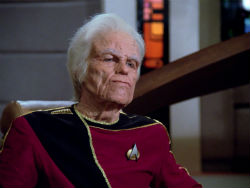 |
| via Wikipedia |
Our heroes are transporting Admiral Mark Jameson (Clayton Rohner) to a hostage negotiation with an old adversary. To complicate matters, the elderly admiral has taken an anti-aging drug with dramatic but ultimately destructive effects. Meanwhle, the hostage situation is a ruse - a trap intended to ensnare, humiliate and kill Jameson.
"Too Short a Season" is definitely a clunker. Critics have objected to Rohner's over-acting, the bad makeup and the lessened involvement of the TNG principals in favor of the Jameson story - all fair points. As for me, I found the writing weak and forced. Trek has confronted aging issues before in TOS's "The Deadly Years" and TAS's "The Counter-Clock Incident." Frankly, neither of those was especially strong either.
Acting Notes
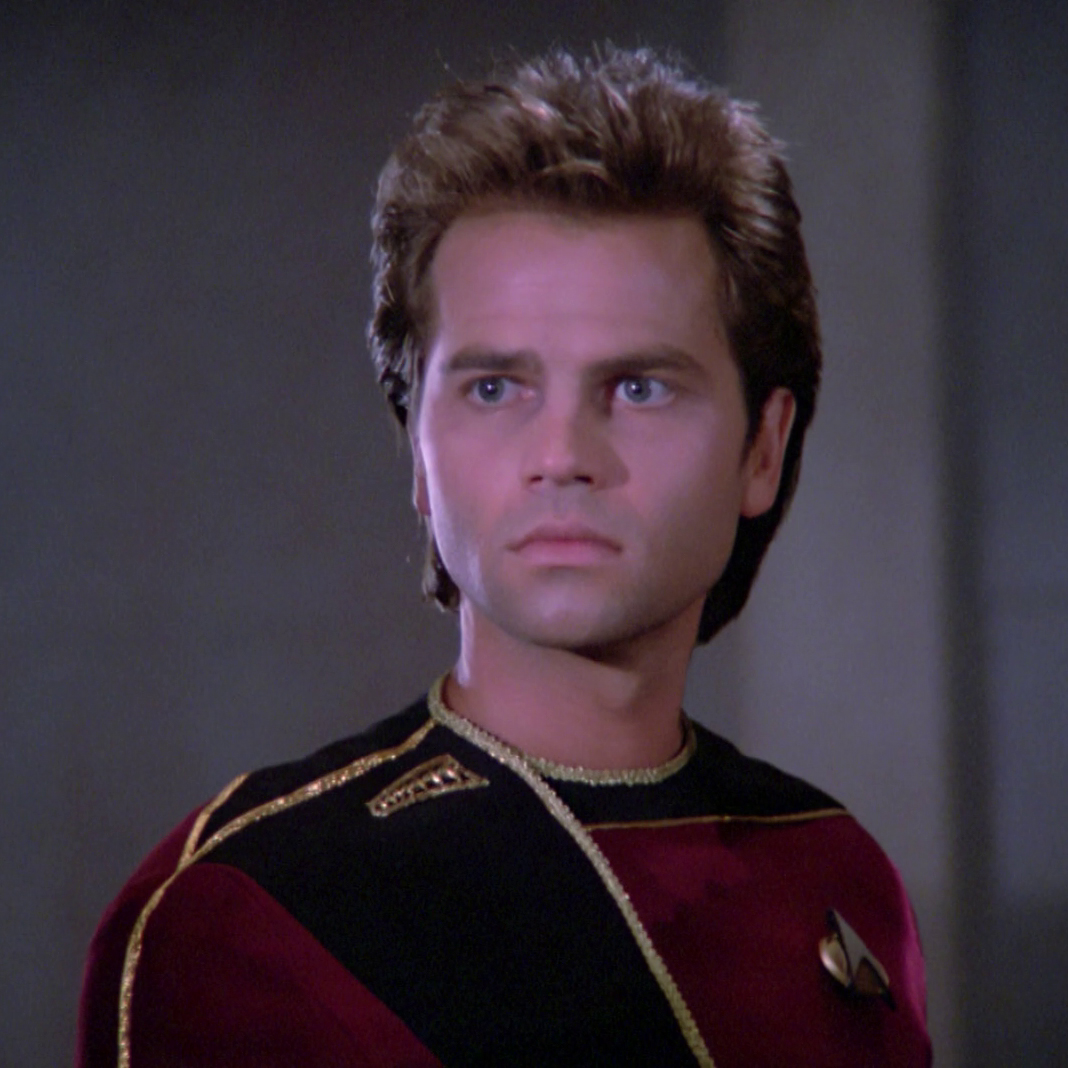 |
| via Memory Alpha |
Clayton Rohner was born August 5, 1957 in Palo Alto, California. He graduated from Whitman College which is located in Walla Walla, Washington. Quick side note: when I told my daughter there was such a place with that name, she thought it was the coolest thing ever.
Rohner's most famous role was Rick Morehouse in 1985's gender bending Just One of the Guys. He has many guest appearances in high profile shows to his credit. His one starring role as a regular was on the mid-'90s legal drama Murder One as Detective Vince Biggio.
Labels:
comics,
good reading,
sources,
star trek,
TNG
Subscribe to:
Posts (Atom)


